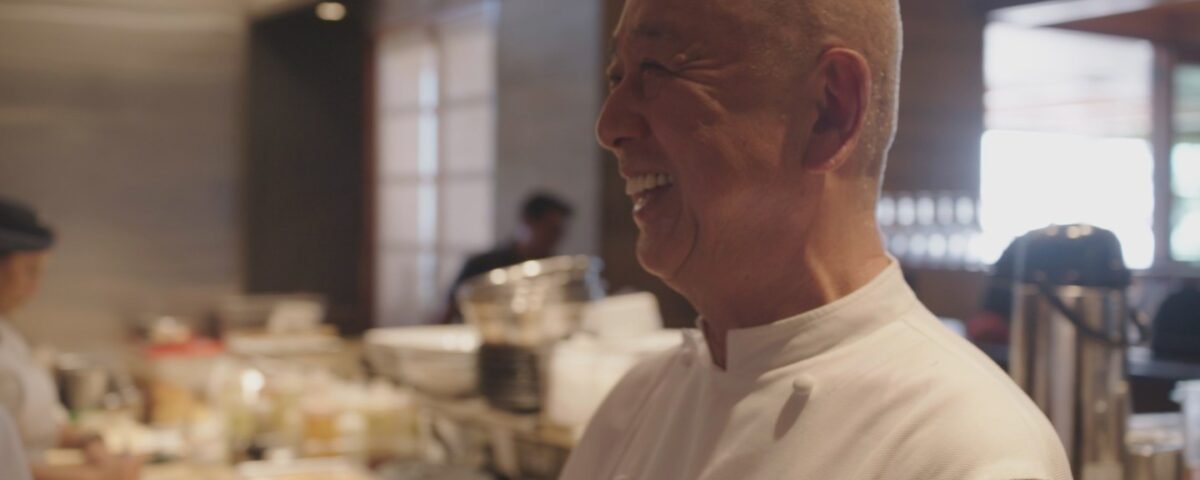


‘Happyend’ Review: High School Becomes a Microcosm of Surveillance-State Oppression in Affecting Near-Future Drama
September 9, 2024


‘Battleground’ Review: A Sober but Overly Academic Italian Drama About the Moral Conflicts of World War I Military Doctors
September 10, 2024In his latest documentary, Matt Tyrnauer chronicles how Nobu Matsuhisa became a global phenomenon.
Nobu
A tasty appetizer, if not a full meal.
A subject’s charm can take a documentary a long way. That’s the case in Matt Tyrnauer’s latest project, Nobu, a glowing portrait of Nobu Matsuhisa. The Japanese chef is best known for his empire of luxury sushi restaurants (and more recently, hotels), where guests can experience his medley of dishes inspired by his Japanese roots and early foray into Peruvian cuisine. In Nobu, based on Matsuhisa’s memoir of the same name, Tyrnauer (also in Telluride this year with Carville: Winning Is Everything, Stupid) anchors the global phenom’s name to a personality.
Tyrnauer shapes Nobu around lengthy interviews with Matsuhisa, who generously details his early years growing up in Japan, his desire to become a sushi chef and the minor successes and major failures of his early ventures. These conversations, supplemented by interviews with Matsuhisa’s wife, Yoko, and his two daughters, Junko and Yoshiko, form a relatively candid biography and showcase Matsuhisa’s personality. His humor — characterized by Dad jokes and deadpan delivery — enlivens his storytelling and makes the early part of the doc feel more intimate. Stories about Matsuhisa’s formative years reveal a childhood marked by premature grief and a fascination with sushi-making. He likens the process of watching a chef delicately press pieces of fish onto rice and serve it to customers to seeing an actor on stage. To Matsuhisa, sushi is not just a cuisine but a performance.
And what a star Matsuhisa has become. Tyrnauer dedicates a significant portion of Nobu to the business of running a global conglomerate. With dozens of restaurants worldwide and a handful of hotels, Nobu is now a luxury good. Tyrnauer travels with the chef — always private, rarely commercial — to his various eateries with a special focus on Nobu Los Cabos and Nobu London. He also sits in on board meetings with Matsuhisa and his Nobu co-founders Robert De Niro and Meir Teper, where the trio negotiate expansion deals and visions of the brand’s future. The filmmaking is direct here, focused more on the transfer of information than scoring style points.
Each of Matsuhisa’s restaurants adheres to Nobu’s modus operandi — intimate luxury, quality food — while also using local ingredients to reflect cultural appetites. Tyrnauer includes interviews with writers like Ruth Reichl and chefs like Wolfgang Puck to help map the chef’s influence on the culinary world. Some of these strands are introduced and abandoned at a fast clip, contrasting with the steady pace established in the biographical section.
With so much to cover and such a flattering sheen, the documentary mostly sidesteps areas of potential tension. When the corporate culture is described as familial, questions about labor practices, including some recent-ish lawsuits, are left unaddressed. And a moment of disagreement between De Niro and Teper about the direction of the company — expand rapidly in pursuit of capital or move slowly to maintain high standards — is observed but not assessed. It’s for this reason that Nobu functions best as a primer, a tasting menu for all things Nobu — man and brand.





